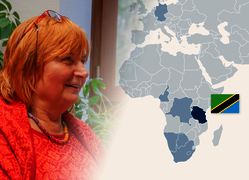22.02.2023

Frauke Bürgers coordinates partnership work at UEM: online and in person. Foto by: Johannes Schermuly, UEM
30 participants came together online to discuss energy and climate change in Germany and Tanzania - for the first time not just from Germany, but from Germany and Tanzania. Accordingly, the focus of the event was not only on Tanzania, but on both countries and their respective contexts.
Europe, including Germany, is currently searching for new energy sources worldwide, also in Tanzania. Against this background, the topics of the seminar were 1. the legal framework of energy export in Tanzania and 2. the impact of the energy crisis on poor households in Germany. Also, the relationship between human rights and energy, as well as the position of the churches on energy and climate protection were on the agenda of the seminar: For example, although energy is not directly a human right, it is often a requirement for the fulfillment of various human rights.
In Tanzania, several laws apply to the energy (export) sector, some of which contradict each other. While the government is already considering exporting energy in the form of liquefied natural gas, rural areas are not yet fully supplied with energy. Although solar energy is an alternative, it has a variety of financial and infrastructural requirements.
One example: UEM coworker Kambale Kahongya has equipped his house in Dar Es Salaam with solar technology to generate sustainable electricity. However, not all people in Tanzania can afford the €5,000 required for this. Not only the financing is problematic, but also the technical support of the systems over decades for repair and maintenance. In this question, Kahongya offered his support to other participants during the seminar. For partnerships, a solution could look like this: Partner congregations in Germany and Tanzania form a joint project budget, into which both contribute according to their means, and from which solar energy for the church roofs in both countries is then financed.
However, the seminar was not only about working on the content, but also about cultivating relationships between those involved in the partnership work. The Zoom rooms remained open after the seminar units. This made new contacts and cooperation possible, as well as reunions across thousands of kilometers: "Oh, I know you from the partnership..." - that's how UEM is getting together in its seminars. The presentations were translated in advance in writing for all participants in their respective languages, the discussions were translated simultaneously.
The seminar was conducted by Matthias Schmid (regional service of the UEM), Klaus Göke (EkvW*, oikos institute), David Mushi (south-north staff of the UEM in Siegen, Germany), Frauke Bürgers (partnership work of the UEM) and Julian Elf (education team of the UEM).
Further seminars on special topics are scheduled for the next weeks: The country seminar Southern Africa will (in person!) ask what young adults and partnerships have to do with sustainability. The country seminar Congo will look at the role of the churches in light of the upcoming elections, and the Rwanda country seminar will focus on "Being Church in Difficult Political Situations."
We look forward to your registration.
*EKvW = Evangelische Kirche von Westfalen (Evangelical Church of Westphalia)
IBAN: DE45 3506 0190 0009 0909 08
SWIFT/BIC: GENODED1DKD
spenden@vemission.org
0202-89004-195
info@vemission.org
0202-89004-0
presse@vemission.org
0202-89004-135
CRDB BANK PLC / Branch 3319
Account# 0250299692300
Swift code: CORUTZTZ
Bank BNI
Account# 0128002447
Swift code: BNINIDJAMDN
info@vemission.org
presse@vemission.org